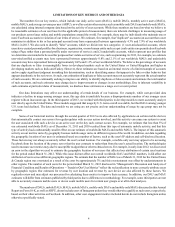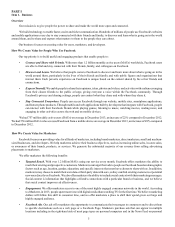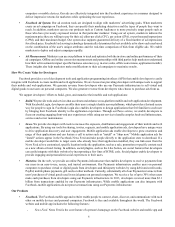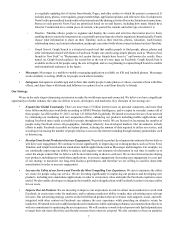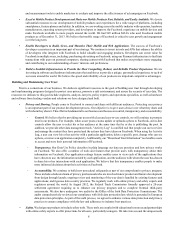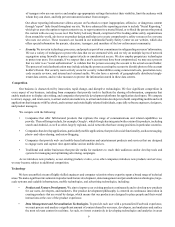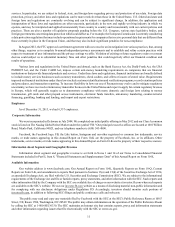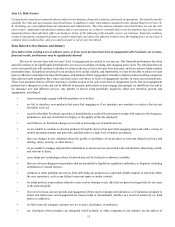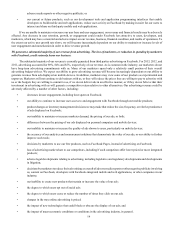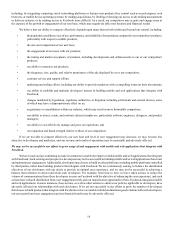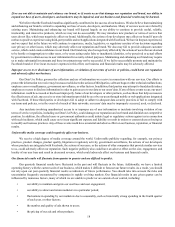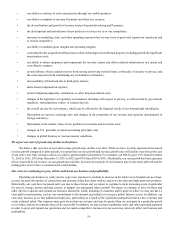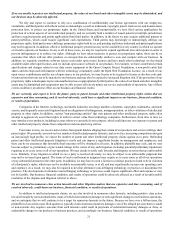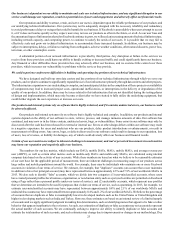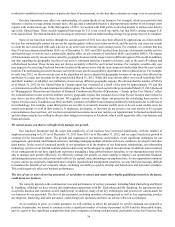Facebook 2013 Annual Report Download - page 16
Download and view the complete annual report
Please find page 16 of the 2013 Facebook annual report below. You can navigate through the pages in the report by either clicking on the pages listed below, or by using the keyword search tool below to find specific information within the annual report.14
adverse media reports or other negative publicity; or
• our current or future products, such as our development tools and application programming interfaces that enable
developers to build mobile and web applications, reduce user activity on Facebook by making it easier for our users to
interact and share on third-party mobile and web applications.
If we are unable to maintain or increase our user base and user engagement, our revenue and financial results may be adversely
affected. Any decrease in user retention, growth, or engagement could render Facebook less attractive to users, developers, and
marketers, which may have a material and adverse impact on our revenue, business, financial condition, and results of operations. To
the extent our active user growth rate slows, we will become increasingly dependent on our ability to maintain or increase levels of
user engagement and monetization in order to drive revenue growth.
We generate a substantial majority of our revenue from advertising. The loss of marketers, or reduction in spending by marketers
with Facebook, could seriously harm our business.
The substantial majority of our revenue is currently generated from third parties advertising on Facebook. For 2013, 2012, and
2011, advertising accounted for 89%, 84% and 85%, respectively, of our revenue. As is common in the industry, our marketers do not
have long-term advertising commitments with us. Many of our marketers spend only a relatively small portion of their overall
advertising budget with us. We expect our ability to grow advertising revenue will become increasingly dependent on our ability to
generate revenue from ads displayed on mobile devices. In addition, marketers may view some of our products as experimental and
unproven. Marketers will not continue to do business with us, or they will reduce the prices they are willing to pay to advertise with
us or the budgets they are willing to commit to us, if we do not deliver ads in an effective manner, or if they do not believe that their
investment in advertising with us will generate a competitive return relative to other alternatives. Our advertising revenue could be
adversely affected by a number of other factors, including:
• decreases in user engagement, including time spent on Facebook;
• our ability to continue to increase user access to and engagement with Facebook through our mobile products;
• product changes or inventory management decisions we may make that reduce the size, frequency, or relative prominence
of ads displayed on Facebook;
• our inability to maintain or increase marketer demand, the pricing of our ads, or both;
• differences between the pricing of our ads displayed on personal computers and mobile devices;
• our inability to maintain or increase the quality of ads shown to users, particularly on mobile devices;
• the accuracy of our analytics and measurement solutions that demonstrate the value of our ads, or our ability to further
improve such tools;
• decisions by marketers to use our free products, such as Facebook Pages, instead of advertising on Facebook;
• loss of advertising market share to our competitors, including if such competitors offer lower priced or more integrated
products;
• adverse legal developments relating to advertising, including legislative and regulatory developments and developments
in litigation;
• decisions by marketers to reduce their advertising as a result of adverse media reports or other negative publicity involving
us, content on Facebook, developers with Facebook-integrated mobile and web applications, or other companies in our
industry;
• our inability to create new products that sustain or increase the value of our ads;
• the degree to which users opt out of social ads;
• the degree to which users cease or reduce the number of times they click on our ads;
• changes in the way online advertising is priced;
• the impact of new technologies that could block or obscure the display of our ads; and
• the impact of macroeconomic conditions or conditions in the advertising industry, in general.


